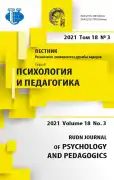An Integrative Model of Intercultural Interaction: A Qualitative Analysis Experience
- Authors: Tkachenko N.V.1, Khukhlaev O.E.1
-
Affiliations:
- Moscow State University of Psychology and Education
- Issue: Vol 18, No 3 (2021)
- Pages: 459-474
- Section: PERSONALITY AND INTERPERSONAL RELATIONSHIPS IN THE INTERCULTURAL DIMENSION: METHODOLOGY OF PSYCHOLOGICAL RESEARCH
- URL: https://journal-vniispk.ru/2313-1683/article/view/325997
- DOI: https://doi.org/10.22363/2313-1683-2021-18-3-459-474
- ID: 325997
Cite item
Full Text
Abstract
The study of intercultural interaction has recently become one of the topical problems of social psychology. Considered often in the context of developing intercultural competence, they nevertheless ignore the mechanisms that underlie the causes of effective or ineffective communication. The mechanism by which intercultural competence contributes to intercultural efficiency is described in an integrative model of intercultural interaction, which unites a group of theories of communicativistic and socio-psychological approaches. This model substantiates the contribution of uncertainty and anxiety to the effectiveness of intercultural communication, which has been widely studied in quantitative studies. The aim of the study is to test the idea of the role of the situation of uncertainty and anxiety in the situation of intercultural interaction using qualitative analysis. The research was carried out based on a theoretical socio-psychological model of intercultural interaction. Using the in-depth interview method and subsequent phenomenological data analysis, a dense description of effective and ineffective intercultural communication was obtained from the point of view of each of the four aspects of the model: anxiety, uncertainty, social identity and intergroup anxiety. As a result of the analysis, data were obtained that reveal the content of some of the blocks of the model (intercultural abilities, communication efficiency, management of uncertainty), as well as a new block (emotion management) was identified and the properties of connections (between anxiety management and communication efficiency, between emotion management and anxiety management) were highlighted. Since the qualitative analysis made it possible to adjust the theoretical integrative model of intercultural interaction, and also revealed additional components of the model that develop theoretical ideas about the mechanisms underlying effective and ineffective communication, the results of this study can serve as a basis for the practice of the training of specialists working in the field of international relations: teachers of multicultural education, HRs in the field of international business, specialists in intercultural consulting, etc.
About the authors
Natalya V. Tkachenko
Moscow State University of Psychology and Education
Author for correspondence.
Email: tkachenkonv@mgppu.ru
ORCID iD: 0000-0002-0315-8511
PhD in Psychology, is Associate Professor of the Department of Ethnopsychology and Psychological Problems of Multicultural Education
29 Sretenka St, Moscow, 127051, Russian FederationOleg E. Khukhlaev
Moscow State University of Psychology and Education
Email: huhlaevoe@mgppu.ru
ORCID iD: 0000-0002-4620-9534
PhD in Psychology, is Head of the Department of Ethnopsychology and Psychological Problems of Multicultural Education
29 Sretenka St, Moscow, 127051, Russian FederationReferences
- Arasaratnam, L., & Doerfel, M. (2005). Intercultural communication competence: Identifying key components from multicultural perspectives. International Journal of Intercultural Relations, 29(2), 137–163. https://doi.org/10.1016/j.ijintrel.2004.04.001
- Creswell, J.W. (1997). Qualitative inquiry and research design: Choosing among five traditions. Thousand Oaks, CA: Sage.
- Euwema, M.C., & van Emmerik, I.J.H. (2007). Intercultural competencies and conglomerated conflict behaviors in intercultural conflicts. International Journal of Intercultural Relations, 31(4), 427–441. https://doi.org/10.1016/j.ijintrel.2006.11.001
- Gudykunst, W.B., & Nishida, T. (2001). Anxiety, uncertainty, and perceived effectiveness of communication across relationships and cultures. International Journal of Intercultural Relations, 25(1), 55–71. https://doi.org/10.1016/S0147-1767(00)00042-0
- Hammer, M.R., Wiseman, R.L., Rasmussen, J.L., & Bruschke, J.C. (1998). A test of anxiety/ uncertainty management theory: The intercultural adaptation context. Communication Quarterly, 46(3), 309–326. https://doi.org/10.1080/01463379809370104
- Khukhlaev, O.E. (2020). Integrative socio-psychological model for assessment and forecasting the effectiveness of intercultural interaction. Social Psychology and Society, 11(4), 26–41. (In Russ.) https://doi.org/10.17759/sps.2020110403
- Kupavskaya, A.S. (2008). Razvitie etnokul'turnoi kompetentnosti podrostka metodom sotsial'no-psikhologicheskogo treninga: Abstract of Ph.D. in Psychology Thesis. Moscow: Lomonosov Moscow State University. (In Russ.)
- Kvale, S. (2003). Issledovatel'skoe interv'yu. Moscow: Smysl Publ. (In Russ.)
- Logan, S., Steel, Z., & Hunt, C. (2015). Investigating the effect of anxiety, uncertainty and ethnocentrism on willingness to interact in an intercultural communication. Journal of Cross-Cultural Psychology, 46(1), 39–52. https://doi.org/10.1177/0022022114555762
- Logan, S., Steel, Z., & Hunt, C. (2016). Intercultural willingness to communicate within health services: Investigating anxiety, uncertainty, ethnocentrism and help seeking behavior. International Journal of Intercultural Relations, 54, 77–86. https://doi.org/10.1016/j.ijintrel.2016.07.007
- Melnikova, O.T., Krichevets, A.N., Gusev, A.N., Busygina, N.P., Khoroshilov, D.A., & Barskiy, F.I. (2014). Criteria for the evaluation of qualitative research. National Psychological Journal, 2(14), 49–51. (In Russ.) https://doi.org/10.11621/npj.2014.0206
- Neuliep, J.W. (2012). The relationship among intercultural communication apprehension, ethnocentrism, uncertainty reduction, and communication satisfaction during initial intercultural interaction: An extension of anxiety and uncertainty management (AUM) theory. Journal of Intercultural Communication Research, 41(1), 1–16. https://doi.org/10.1080/17475759.2011.623239
- Presbitero, A., & Attar, H. (2018). Intercultural communication effectiveness, cultural intelligence and knowledge sharing: Extending anxiety-uncertainty management theory. International Journal of Intercultural Relations, 67, 35–43. https://doi.org/10.1016/j.ijintrel.2018.08.004
- Smith, J.A., & Osborn, M. (2007). Interpretative phenomenological analysis. In J.A. Smith (Ed.), Qualitative Psychology (pp. 53–80). London: Sage Publications.
- Soldatova, G.U., & Shaigerova, L.A. (2015). Refleksiya mnozhestvennosti vybora v psikhologii mezhkul'turnykh kommunikatsii. Psikhologicheskie Issledovaniya, 8(40), 10. (In Russ.)
- Starks, H., & Trinidad, S.B. (2007). Choose your method: A comparison of phenomenology, discourse analysis, and grounded theory. Qualitative Health Research, 17(10), 1372–1380. https://doi.org/10.1177/1049732307307031
Supplementary files









